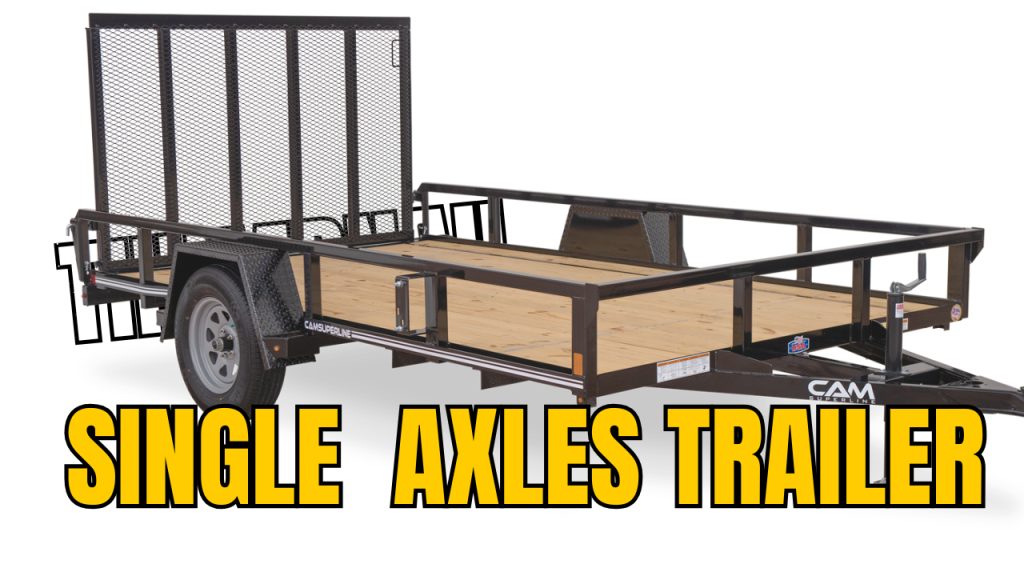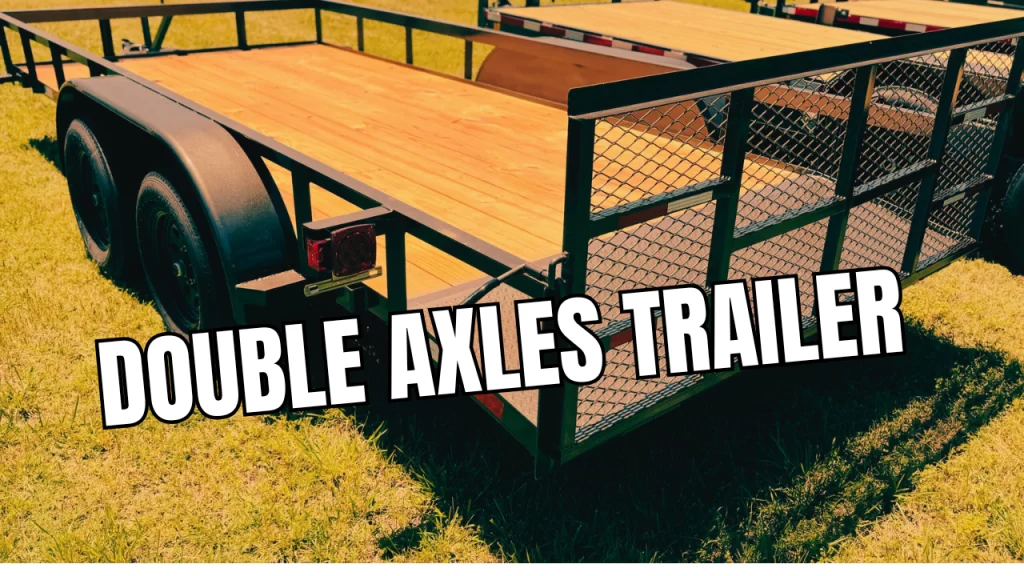Selecting the right trailer for transportation can be difficult and it also takes time and effort. Should I go with a single-axle or double-axle trailer? This is a common question that comes to your mind. But don’t worry, we will help you figure it out.
Knowing the differences between single-axle and double-axle trailers is necessary to determine which trailer suits your needs and situation. So, the final answer depends on your load capacity, budget and usage.
In this article, you will know everything about single-axle and tandem-axle trailers. By the end, you will have a clear answer about which trailer is the best option for your situation. So, let’s drive in.
What is a Single Axle Trailer?
This type of trailer has a single axle to transfer the load and two wheels on both ends. This axle is designed to bear the weight of the cargo properly. Single-axle trailers are small, light and they are easy to move. That’s why, they are designed to carry light loads and are preferred for light-duty tasks.

Uses of Single Axle Trailer
Because of its uses in carrying the light weighted objects, the following are the common applications of single axle trailers.
- Light hauling appliances
- Moving furniture
- Carrying lawn care equipment
- Towing motorcycles
- Transporting landscaping materials
- Hauling off-roading vehicles
- Towing small tractors
- Lightweight vehicles such as boats and all-terrain vehicles (ATVs).
Single Axle Trailer Weight Capacity
The maximum weight a single-axle trailer can carry easily is its weight-carrying capacity. It depends upon the diameter of the trailer. The weight that an axle of any particular diameter can carry can be found in the following simple guideline.
- 1.5-inch diameter axle: 1000 lbs
- 1.75-inch diameter axle: 2,000 lbs.
- 2.375-inch diameter: 3,500 lbs
- 3-inch diameter: 6,000 lbs
- 3.5-inch diameter: 8,000 lbs
- 4-inch diameter: 9,000 lbs
- 5-inch diameter: 10,000 lbs
What is the Double Axles Trailer?
A double-axle trailer is also known as a tandem-axle trailer and dual-axle trailer. It consists of two axles, each with two wheels, for a total of four wheels. Dual-axle trailers are mostly designed for carrying heavy-duty tasks and towing heavy weights over a long distance.

Uses of Double Axle Trailer
Due to its use in heavy-duty tasks, it is preferred for
- Heavy-Duty Hauling
- Industrial Use
- Recreational Purposes
- Livestock Transport
- State equipment transport
Double Axle Trailer Weight Capacity
Dual-axle trailer weight capacity can vary, depending on the model and the trailer’s axle capacities. If you want to estimate the weight capacity of a dual axle trailer, first find the diameter of one axle and then find its payload capacity. In the end, you should have multiple axles and payload capacity. However, some tandem axles can tow as much as 34,000 pounds.
Key differences between the Single axle Trailer and Double axle trailer
To select the trailer that fits your needs, you should know its major differences. Understanding the following differences between these trailers will be helpful as each type has its own considerations
| Feature | Single Axle Trailer | Dual Axle Trailer |
| Design and Axle Count | One axle with two wheels | Two axles with four wheels |
| Weight Towing Capacity | Suitable for lighter loads (up to 10,000 lbs) | Designed for heavier loads (up to 34,000 lbs) |
| Weight Distribution | Weight is evenly distributed on a single axle. | Even weight is distributed across two axles |
| Size and Maneuverability | It is small and easy to move around in small spaces. | It is large and requires more space to maneuver |
| Stability and Ride Quality | More chances of jumping and suitable for short distances | Greater stability and smoother ride over long distances |
| Suspension System | Basic suspension and lack advanced features | Have advanced suspension systems |
| Braking | May not include brakes for lower weight limits | Equipped with braking systems on one or both axles |
| Tire Usage | More wear on tires | Reduced wear due to better weight distribution |
Advantages and disadvantages of Single axle trailer
Understanding the advantages and disadvantages of single-axle trailer is important to learn its impact.
Advantages of Single Axle Trailer
- It is cost-effective to purchase and has cheaper maintenance expenses
- it is lightweight and easy to tow
- It has minimal drag, which optimizes fuel efficiency.
- It requires less wear and tear due to simple construction.
- It is preferred for short-distance towing and for lightweight.
Disadvantages of Single Axle Trailer
- It has low weight capacity, i.e., it is limited to lighter-weight.
- It has less stability and reduced control.
- It has increased wear on the tires due to the presence of a single axle.
- Single axle trailers lack braking systems.
Advantages and Disadvantages of Double Axle Trailer
Knowing the benefits and drawbacks of a tandem axle trailer will help you know whether it is beneficial for your needs.
Advantages of Double Axle Trailer
- It has a high weight capacity and is useful for heavy-weight towing.
- The Tandem axle trailer has high stability due to even weight distribution.
- Dual axle trailers have a high life span due to the presence of two axles, which require less wear and tear.
- It has an advanced braking system, which ensures more safety.
Disadvantages of Double Axle Trailer
- Double-axle trailers are more expensive to purchase and maintain.
- Due to their larger size and weight, they are harder to maneuver in tight spaces.
- Tandem axle trailers demand more fuel because of their increased weight.
Factors to Consider When Choosing the Right Trailer for Your Needs
You must consider several factors while selecting which type of trailer suits your needs and situation.
Weight and type of cargo: You should know the type, size, and weight of the items you will transport on the trailer.
Towing Vehicle Compatibility with Trailer: Your vehicle’s towing capacity must be compatible with the combined gross weight of the trailer and cargo.
Distance: A single-axle trailer is recommended for a short-distance transport system, and a dual-axle trailer is the best option for a long-distance transport system.
Budget: A single-axle trailer is a budget-friendly option, as they are less expensive. while the tandem-axle one requires less maintenance.
Maintenance: One axle trailer usually requires less maintenance because it has less components and parts
Safety consideration: Tandem axle trailers are usually safer than single axle trailer because they have an advanced braking system.
Maintenance Requirement for Trailers
Maintenance of Single Axle Trailer
- Regularly check pressure on tires and track depth for safety.
- Check the brakes for wear if they are installed.
- Check that the brake lights and turn signals are working.
- Regularly check the condition of the hitch, coupler, and safety chains.
- Wash it regularly to prevent rust and corrosion.
Maintenance of Double Axle Trailer
In addition to the maintenance actions for single-axle trailers, the following areas also require maintenance for tandem-axle trailers:
- Check both axles and suspension systems for wear.
- Ensure the load is evenly distributed to prevent axle overload.
- Maintain and balance brakes on both axles.
- Grease and inspect the wheels’ direction regularly.
- Rotate tires to ensure even wear.
Conclusion:
It would be easy to identify the correct trailer choice when you understand the difference between a single-axle trailer and an axis trailer. Both types have their strengths and weaknesses, although the major differences are the number of axles and their weight carry capacity.
Selecting the right trailer ensures efficiency, safety and also saves your money. If you’re still unsure, you can also contact a professional to identify the right trailer for your situation.
FAQs:
Which type of trailer is affordable?
A single-axle trailer is affordable but it is efficient for light-duty tasks.
How do axles affect trailer performance?
The positioning of the axles majorly impacts weight distribution, stability, and overall trailer performance. When the axles are correctly placed, they ensure balanced load distribution.
What is the purpose of a spread axle trailer?
The purpose of a spread axle trailer is to distribute weight evenly, provide a smoother ride, and track better behind the towing vehicle.
Do I need a special license to tow a trailer?
License requirements for towing a trailer depend on the trailer’s weight and the vehicle towing it. They also depend on whether we are using the trailer for commercial purposes.
What happens if I overload a single axle trailer?
Overloading a single-axle trailer can lead to instability, tire damage, and axle failure.

Single Axle Trailer vs Double Axle Trailer